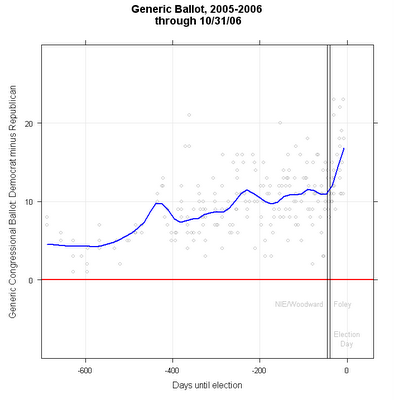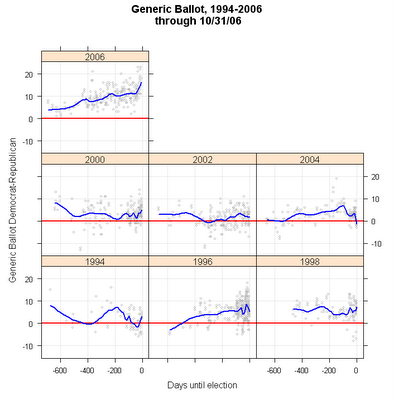
The generic ballot measure of the House has surged up and not stopped rising since September 22. The surge began the week in which the National Intelligence Estimate (NIE) appeared, followed by Bob Woodward's book, State of Denial. A week later the Foley scandal broke, adding to the move that began a week earlier.
The week or so before the NIE was published there was a small trend in the Republican direction which was remarked on in political news, but this very modest movement was abruptly revered. I would not have thought the NIE or Woodward revelations would have had much effect on mass public opinion, but the timing here is pretty convincing that these did in fact play a role. I speculate that was due to undermining the growth in approval of the administration on terrorism which built in late August and early September, though convincing data of this link is missing. Certainly no such inference is needed with regard to the impact of the subsequent Foley scandal.
The generic ballot is, of course, only a rough indicator of election outcomes (see here, but also see the forecasting efforts of Bafumi, Erikson and Wlezien here and Alan Abramowitz here). I also think the current upturn is a political equivalent of "irrational exuberance" in the sense that the run up in the polls seems likely to seriously overstate the actual vote margin. The current 17 point Democratic margin would be enormous, and even applying the "Charlie Cook Correction" of subtracting 5 points would still imply a 56-44 Democratic triumph. It may happen, but the generic ballot has virtually always overstated the Democratic lead, and this overstatement seems to get worst as the polling margin increases.
For a bit of perspective, the figure below plots the generic ballot since 1994. The conclusion is clear-- the poll measure has not been anywhere near current levels in the past 12 years. The practical result of this remains to be seen, but if Democrats fail to capitalize on this opinion advantage there will be some interesting research to understand why the seat gains fail to respond to this advantage in vote intent (well, in generic vote intent, which isn't the same thing.)

Click here to go to Table of Contents